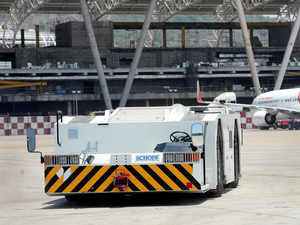
The company, a joint venture between the national carrier and SATS, a Singaporean ground-handler and inflight caterer, plans to pass on the extra costs of additional cleaning and sanitisation and baggage handling to its airline customers, chief commercial officer Raj Andrade told ET in an interview.
It also plans to invest in hi-tech UV-C emitting machines to clean aircraft interiors and is in talks with airport operators at New Delhi, Bengaluru and Hyderabad for automation of aprons.
“To borrow a new extended adage from one of our customers, cash is king but cooperation is queen,” said Andrade,explaining his plans to increase charges for ground services.
AI-SATS has 40 airline customers including its parent Air India, Vistara as well as SpiceJet and Go Air at some airports. Before the Covid-19 outbreak, its 11,000 employees handled 12,000 flights every day across airports at New Delhi, Hyderabad, Bengaluru, Mangalore and Trivandrum.
On March 24, the government suspended all flights as part of a nationwide lockdown. Since then, AI-SATS, like its customers, has been in a no-revenue situation, using only 5% of its workforce and providing services mostly to repatriation flights operated to ferry people to their homelands. It has provided services to 400 flights operated by 44 planes that have ferried 22,000 passengers to 125 destinations.
Flights resumed in a calibrated manner on May 25. The government has mandated several rules, including cleaning and sanitising aircraft interiors at every stop, sanitising frequent touch surfaces at airport check-in counters and passenger luggage.
On many occasions, AI-SATS has had to use a specific, more expensive cleaning liquid mandated by a customer airline to clean its planes. Andrade said the employees also staff the check-in counters for AI-SATS customers and have had to bear with many an irritable customer who wasn’t well versed with the new rules of air travel.
Andrade said work has doubled, but it’s still using less than 10% of its workforce. Like its industry peers and airline customers, AI-SATS has had to take some stringent cost-cutting measures. Senior executives took salary cuts of up to 40%, but 90% of the staff has been untouched, he said.
AI-SATS has been in talks with airport operators at New Delhi, Bengaluru and Hyderabad for automation of aircraft aprons.
“The talks have been on for a while but this crisis and the demands for enhanced hygiene and social distancing have underlined the need for automation much more critically,” he added.
Download The Economic Times News App to get Daily Market Updates & Live Business News.
Read More News on
Download The Economic Times News App to get Daily Market Updates & Live Business News.









 Get Unlimited Access to The Economic Times
Get Unlimited Access to The Economic Times
